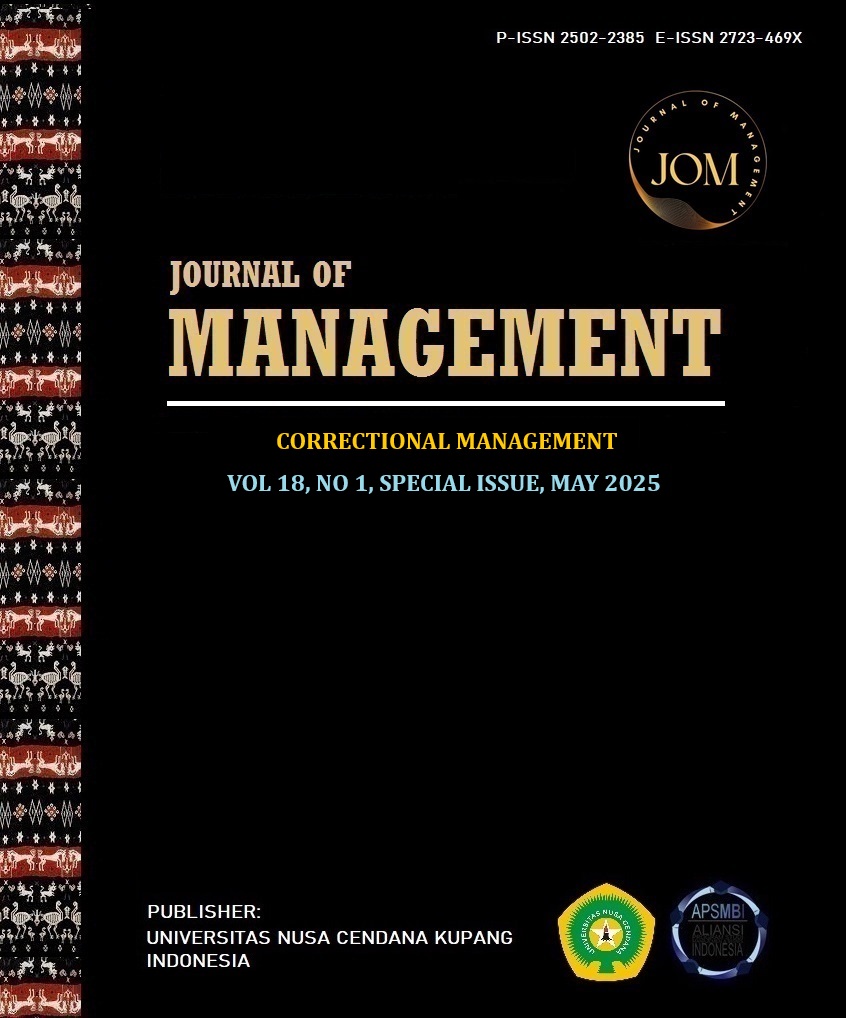THE INFLUENCE OF SELF SERVICE TECHNOLOGY ON PRISONER SATISFACTION IN CLASS IIB CILACAP PRISON
Abstract
Prisoners in prison have rights that must be fulfilled. Fulfillment of prisoner rights is carried out through services provided by prison officers to prisoners so that prisoners feel satisfied with the service of fulfilling their rights, so that there is no extortion. Self-service technology is one of the renewals of the service system for prisoners in the form of technology to improve the quality of service so that prisoners feel satisfied, and there is no commotion in prison. The formulation of the problem in this study is whether there is an influence of self-service technology on prisoner satisfaction in Class IIB Cilacap Prison. This study aims to determine the effect of self-service technology on prisoner satisfaction in Class IIB Cilacap Prison. The method used in this study is quantitative, with a simple random sampling technique of 200 respondents. The data collection technique was carried out using a questionnaire distributed to prisoners. The data analysis techniques used were the normality test, the simple linear regression test, the significance test, and the determination test. The results of the study showed that there is an influence of self-service technology on prisoner satisfaction. The level of influence given by the self-service technology variable on prisoner satisfaction is 72.9%, while the remaining 27.1% is influenced by other variables. From these results, it can be concluded that there is an influence of self-service technology on prisoner satisfaction at Class IIB Cilacap Prison.
Keywords: Self Service Technology; Prisoner Satisfaction; Correctional
Downloads
References
Curran, J. M., & Meuter, M. L. (2005). Self-service technology adoption: Comparing three technologies. Journal of Services Marketing, 19(2), 103–113. https://doi.org/10.1108/08876040510591411
Desanuari, G. F., & Ludtriani, R. (2022). Pengaruh self service technology terhadap pengembangan usaha dan kepuasan konsumen di masa pandemi covid-19 pada model bisnis restoran. Jurnal Ilmiah Multidisiplin, 1(4), 268–273.
Fatini, N. A., & Dewi, R. S. (2020). Pengaruh Kualitas Produk Dan Kualitas Pelayanan Terhadap Kepuasan Pengunjung Wisata Vanaprastha Gedong Songo Park Kabupaten Semarang. Jurnal Administrasi Bisnis Departemen Administrasi Bisnis, 024.
Ghozali, I. (2016). Aplikasi Analisis Multivariate dengan Program IBM SPSS 23. In BPFE Universitas Diponegoro.
Hawkins & Lonney. (2003). Faktor-faktor yang mempengaruhi kesetiaan terhadap merek pada konsumen pasta gigi Pepsodent di Surabaya. Jurnal Penelitian UNIB.
Jamilah, A., & Disemadi, H. S. (2020). Pidana Kerja Sosial: Kebijakan Penanggulangan Overcrowding Penjara. Jurnal IUS Kajian Hukum Dan Keadilan, 8(1), 26.
Kotler & Amstrong. (2008). Prinsip Prinsip Pemasaran. Erlangga.
Li, S. (2020). The impact of service quality, self-service technology, and the corporate image on customer satisfaction and customer revisit intention among luxury hotels in Kuala Lumpur, Malaysia. International Journal of Services, Economics and Management, 11(1), 48–70.
Magenta, Y. A., & Pangestuti, N. (2022). Pengaruh Kualitas Layanan Lapas Media Terhadap Kepuasan Narapidana dalam Menjalani Pembinaan di Lapas Kelas IIB Slawi. Jurnal Pendidikan Dan Koseling, 4(6), 2302–2315.
Meuter, M. L., Ostrom, A. L., Roundtree, R. I., & Bitner, M. J. (2000). Self-Service Technologies : Satisfaction with Technology-Based. 64(July), 50–64.

 Putri Farah Hanizah(1*)
Putri Farah Hanizah(1*)



